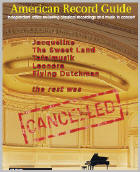Texte paru dans: / Appeared in: Brilliant Classics |
||||
|
Outil de traduction ~ (Très approximatif) |
||||
|
Reviewer: Catherine
Moore Alessandro Melani (1639–1703) was a prominent composer in Rome who served as maestro di cappella at several important churches and was known for theatrical as well as liturgical works. His 1682 Opus 3 collection of motets is dedicated to Ferdinando de' Medici, Grand Duke of Tuscany, the same "Gran Principe" in the name of this ensemble. Most (12) of the 18 motets are for 2 voices, 4 for 3 voices, and 2 for 5. The continuo group includes organ, harpsichord, theorbo, cello, and contrabass. The performances vary in quality. The finest are very fine—especially the three motets for two altos ('Fallacicum Sono', 'Alma Redemptoris', and 'Iustus Ut Palma'). Expressive interplay between soloists Margherita Tani and Vincenzo Franchini is by turns bold, nuanced, and flexible. The sopranos, Valentina Vitolo and Francesca Caponi, are well matched in 'Cantemus Domino', and show a fitting lightness that suits the text in faster sections of 'Congregate Caetum' (SSB). In Salve Superum Regina' there's an attractive intimacy as the duo enumerates the Virgin Mary's attributes, their voices folding into each other like supple pleats in soft cloth. Elsewhere, as in 'O Felix Anima', there's a nice languid tone; but some of the melismas are rather labored. Although clipped articulation and hard–edged timbre depict the "ad arma" call–to–arms text in 'Ad Arma Cor Meum' (SB), there's also a certain strident tone in the upper voice. Sometimes ensemble members drift apart in pitch or time (for example, in 'Derelinquat Impius') and slower sections expose vocal strain and other weaknesses ('Date Voces Pueri'). Notes, bios, no texts. | ||||
|
||||
|
|
|
|||
|
Cliquez l'un ou l'autre
bouton pour découvrir bien d'autres critiques de CD |
||||




